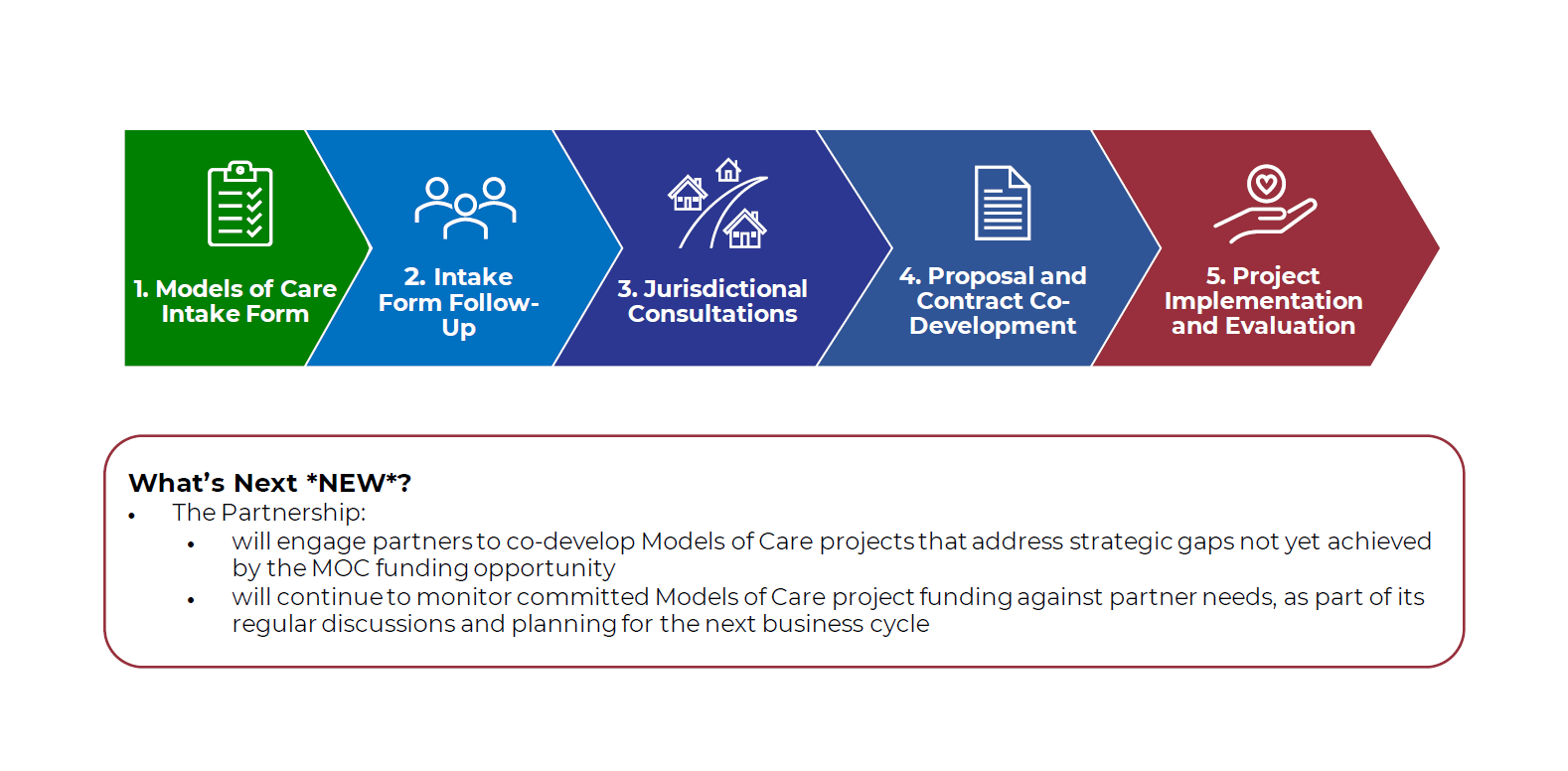Models of Care Funding Initiative Information Page

The rising burden of cancer in Canada, along with increasing expectations for culturally safe person-centred care closer to home, limited health human resources, and the COVID-19 pandemic have placed increasing pressure on cancer care provider capacity and deepened inequities in access to care. Now with many jurisdictions focusing on the road to pandemic recovery, there is an opportunity to enhance the efficiency, quality, and equity of cancer care delivery.
As part of advancing Priorities 2, 3, 5 and 7 of the refreshed Canadian Strategy for Cancer Control (the Strategy), and in response to a request from partners, the Canadian Partnership Against Cancer (the Partnership) will support jurisdictions to design, implement and evaluate innovative models of care as part of the 2022-2027 business cycle.
The Partnership has launched the Models of Care pan-Canadian funding initiative. This online space provides partners with information and resources to support the completion of the Models of Care Intake Form and as a space to support partners through the summer/fall consultation period. Please continue to monitor this site for the most up to date information on the Models of Care funding initiative. If you have any questions, please contact tc@partnershipagainstcancer.ca.
Timeline

FAQ (updated January 15, 2024)
- Download the FAQ (updated January 15, 2024)
- If your question has not been answered by the FAQ, please email tc@partnershipagainstcancer.ca
CPAC’s Focus on Health Equity
- An equitable cancer system is fundamental to improving cancer care in Canada and around the world. Equity is embedded in the ultimate outcomes of the Canadian Strategy for Cancer Control (the Strategy) – all people in Canada have access to high quality cancer care – and anchors CPAC’s 2022 to 2027 Business Plan. CPAC’s specific role is grounded in improving health equity in cancer care. View CPAC’s Focus on Health Equity
- The purpose of the case study, Embedding Equity in Your Project Design, is to provide jurisdictional partners with an illustrative example of how partners could design an equity-focused model of care project. The case study is fictitious and does not represent the only approach that partners could take. Nor does the case study represent a comprehensive or exhaustive list of equity considerations. Download the case study
Models of Care Toolkit Webinars
Recordings
-
Models of Care Toolkit Webinar
The Models of Care Toolkit webinar provided an overview of the toolkit and how it can be used to support jurisdictions' implementation of models of care.
-
Virtual Open House
The purpose of the open house was to provide an overview of the Models of Care funding initiative and to answer questions related to the Models of Care Planning Survey and funding initiative.
-
Virtual Open House Q&A
Watch the June 9th open house recording. It includes the Q&A portion of the session.
-
Virtual Open House slide presentation
Download the presentation slides.
Project Implementation Readiness Assessment Tool
This readiness assessment tool comprises a series of questions to evaluate jurisdictional context and readiness for implementation of a specific project, with a focus on embedding an equity approach. We recommend completing this assessment during the initial planning phases of a project (e.g., before and/or during proposal development; for reference after proposal development). An assessment of context and readiness prior to introducing or scaling-up a project allows teams to identify potential barriers and facilitators in a jurisdiction that could impact successful project implementation and sustainability. This assessment will enable teams to build on identified strengths and address gaps to inform detailed planning to ensure key readiness factors are considered.
Download the Project Implementation Readiness Assessment Tool
IAP2 Spectrum
The Partnership recommends jurisdictions and key partners use the IAP2 Spectrum (developed by the International Association for Public Participation) as a helpful resource to support with developing a meaningful community engagement approach for their Model of Care project. The community engagement approach should be determined in collaboration with the community and grounded in the IAP2 Spectrum from “Consult” to “Empower”. Projects should consider and align with the needs, preferences and capacity of the community partners or representatives engaged in the work, as well as the resources, capacity, and experience of jurisdictions to support the engagement.
Partnership Council (May 2, 2022)
- The purpose of this agenda item was to launch the models of care pan-Canadian funding initiative and provide an overview of the planning phase intended to support partners in readying for implementation.
- Access the briefing note and presentation.
Models of Care Toolkit
The toolkit provides detailed information on innovative, evidence-informed models of care, with examples of care models used in Canada and internationally. View the toolkit
